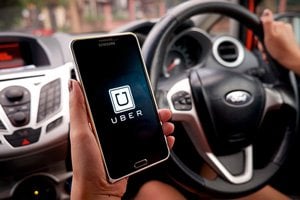Much like its competitor, Lyft Inc. (NASDAQ: LYFT), Uber Technologies Inc. (NYSE: UBER) was one of the biggest "unicorns" to hit the market in 2019. And while it had massive amounts of hype behind it, we don't recommend buying Uber stock after the IPO.
In fact, Money Morning Capital Wave Strategist Shah Gilani says Uber is "2019's stupidest IPO." There were plenty of red flags surrounding the company, but the simplest reason why is that it waited too long to go public.

Uber had been hyped up for years now. On top of that, bankers promised that the Uber market cap would be around $120 billion during the company's road show.
However, by the end of Uber's first day of trading, the market cap was roughly $69 billion at best - almost half of what was promised. Because of this, Uber ended up being the biggest IPO flop since 1975.
But there are plenty of other reasons why Uber stock has turned into a complete dud...
Don't Buy Uber Stock After the IPO
Over the past decade, Uber has raised roughly $24 billion in private equity, venture capital, and late-stage investor money. And the longer the company waited to go public, the more private investors desperately wanted to get out.
So, finally, Uber went public. And much like its biggest competitor, Lyft, private investors looked to cash out as quickly as possible once the IPO dropped.
In Lyft's case, early-stage investor Carl Icahn immediately sold 2.7% of his stake to George Soros - close to Lyft's $72 IPO price. That was worth roughly $550 million at the IPO price. Now, Lyft's stock price has tumbled 24.24% to $54.55.
The same thing more or less happened with Uber stock - not taking into account the private investors that Morgan Stanley (NYSE: MS) has locked out from selling for at least six months.
But that's just one reason to not buy Uber stock. And it's only the beginning.
Another 6.8 Billion Reasons to Not Buy Uber After the IPO
[mmpazkzone name="in-story" network="9794" site="307044" id="137008" type="4"]
In 2017 alone, Uber flushed $4 billion down the drain. After it added money to its balance sheet from the $997 million sales in 2018, it lost $3.3 billion more.
Beyond that, between 2014 and 2018, the U.S. Securities and Exchange Commission (SEC) says Uber lost a total of $6.8 billion.
Even if you were to spread those losses out more evenly, it would still be $1.7 billion in losses per year. And in Uber's SEC filing, the company said its operating expenses are expected to drastically increase for the foreseeable future.
Uber has never been even remotely close to profitable, and its IPO filing says it's likely that it never will be.
That's completely absurd, but it only gets worse...
Uber's "Business Model" Is a Mess
Uber actually achieved 5.2 billion rides in 2018, but it also lost $0.58 on every single one of them.
Uber's entire business relies on contracted "freelance" drivers that use their own vehicles to drive users around. Once the fare is paid, a portion of it is sent directly to the company.
But its drivers aren't paid minimum wage. Beyond that, they have no benefits, pensions, or stock options. Drivers are also responsible for their own fuel, vehicle care, and insurance.
This has caused a backlash among Uber drivers. Some have gone on strike, while others in emerging markets are clamoring for a driver's union.
On the flip side of things, there are also places like Argentina, where the company and its drivers are illegally operating - resulting in heavy fines and the seizing of vehicles.
In an attempt to tackle some of these problems, Uber's goal is to go driverless.
In fact, one of Uber's biggest expenses involves R&D on this matter. It's literally dumping cash into self-driving cars.
Uber spent $1.2 billion on the technology behind self-driving cars in 2017. In 2018, it increased to $1.5 billion. Of 2018's $1.5 billion, $457 million was spent on autonomous vehicle research.
Uber Scandals
Over the past three years alone, Uber has been plagued with sexual harassment scandals, lawsuits, and evidence of a terrible internal culture.
After founder and former CEO Travis Kalanick stepped down in 2017, Dara Khosrowshahi of Expedia took over shortly after. While there has been progress with new credos such as, "We do the right thing," it hasn't been enough to produce a bottom-line result that isn't red.
Before the IPO, this is a company that should have invested more time and resources in its existing troubles. But it didn't.
So, if you were interested in Uber stock, Money Morning recommends skipping this one.
5G Is Coming: The Breakthrough of the Century Could Rest on This $6 Stock
CNBC reports that this opportunity is worth $12.3 trillion... and it's gearing up to make an appearance all over America.
In fact, some of these devices are showing up right in your neighborhood - and I'm willing to bet you didn't even notice.
Our Silicon Valley insider mapped out all the details in this report.



